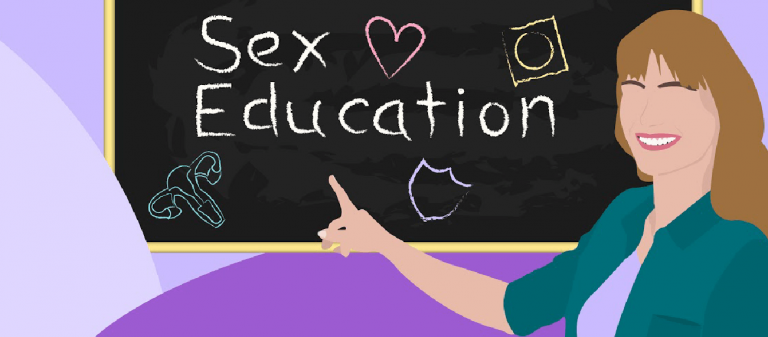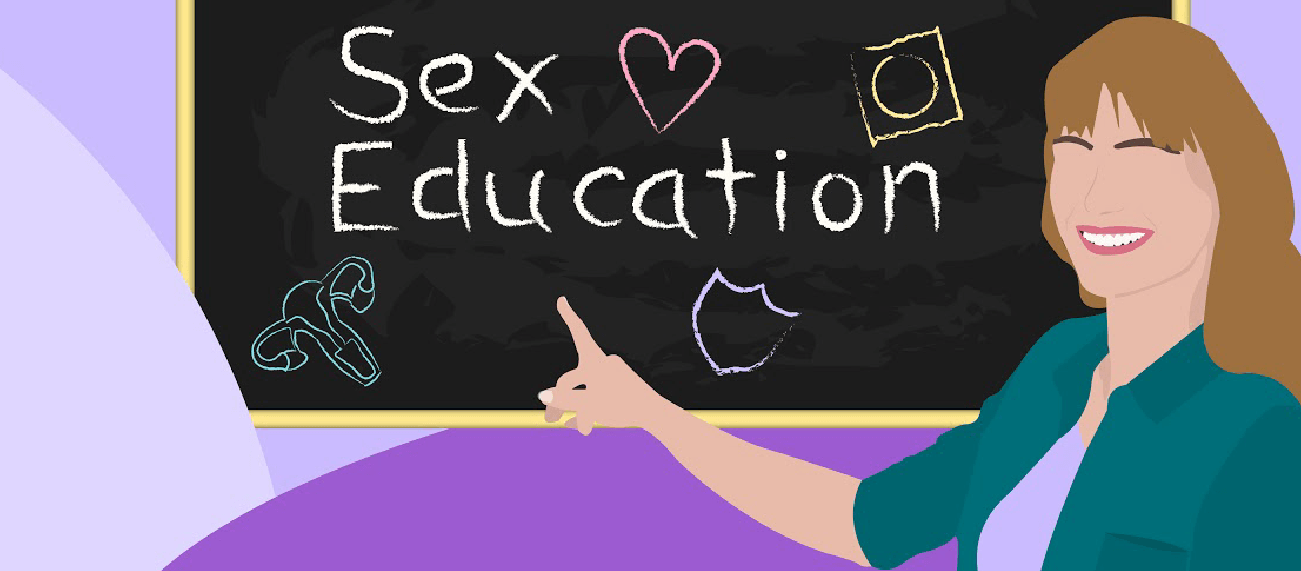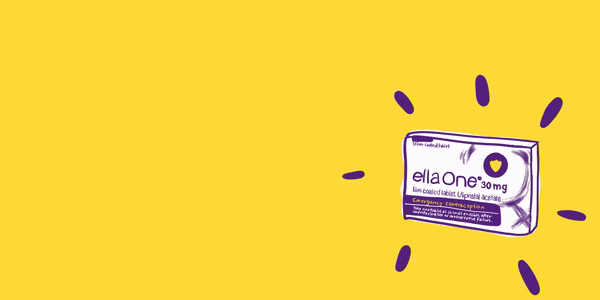What was your sex education like in school? Did your teacher faint while describing a diagram? Were you traumatised by Mr Higgins, your history teacher, who said condoms came in small, medium and “Mr Higgins” size? Can you even remember having sex education at all?
In February 2019, the Department of Education unveiled new sex education guidelines which will be rolled out in primary and secondary schools by 2020.
The new curriculum will include healthy relationship education at primary school, lessons on menstrual health, sexting, FGM and mental health in secondary school. The lessons will also be LGBTQ+ inclusive.
How can schools give sex-positive and accurate information on sex, relationships and contraception while still being age-appropriate? We spoke to Becky Lund-Harket, a workshops facilitator at Sexplain and founder of The Candid Collective, to find out more.
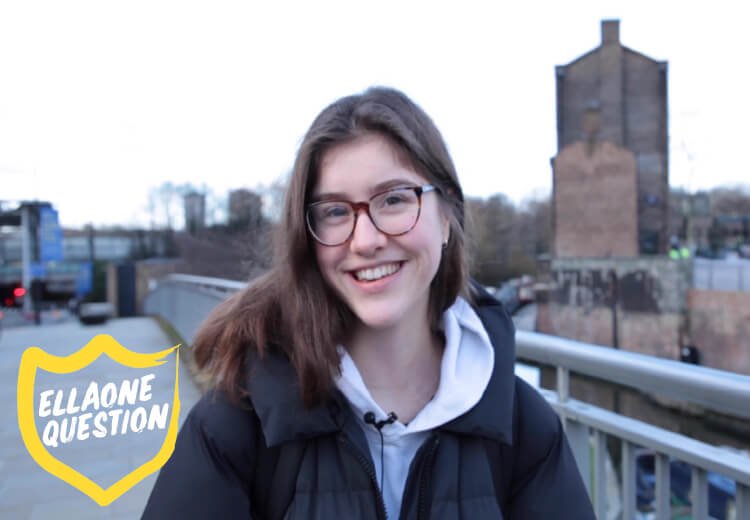
What Is Sexplain?
Sexplain is an organisation which runs sex and relationship workshops for year sevens up to sixth form. In the workshops, Sexplain facilitators cover consent, porn, healthy relationships, gender, sexting and more.
Becky Lund-Harket believes that taking an honest, sex-positive approach to sex education can make a huge difference to young people.
What does the term “sex positive” mean?
Most of us have heard the phrase “sex positive”, but what does it actually mean and is it just for people who have sex five times a day?
“It’s about being open and talking about sex in a non-judgemental, non-shaming way,” says Becky, “In our culture, and in many other societies past and present, there is a lot of shame tied up with talking about sex.”
“English people are not very good at talking about anything that’s mildly embarrassing or personal, so sex positivity can be a really healthy way of just talking about sex in general.”
How do you talk about sex in an age-appropriate way?
One of the concerns about sex education is the idea that it is exposing children to things they are too young to learn and potentially don’t need to know. So how can you educate young people without being too graphic?
“You’re not going to talk about sex graphically with eleven-year-olds,” says Becky, “but you can talk about consent and relationships. Healthy relationships in the context of friendships and family relationships, for example.”
Is sex education putting ideas in teenagers heads?
Some people seem to think that by acknowledging that sex exists and talking openly about it, you are actively encouraging young people to get it on.
The truth, however, is that young people are probably already thinking about sex and we should be teaching them about contraception, consent and being respectful to themselves and others rather than shutting down the conversation and pushing them towards dodgy Google searches and pornography.
“I was talking to a 14-year-old pupil once,” says Becky, “and she said she felt that adults don’t want to talk to teenagers about sex because they think that if they don’t talk about it then the teenagers won’t have it. I asked her if she thought that was a good idea and she was just like “No!”
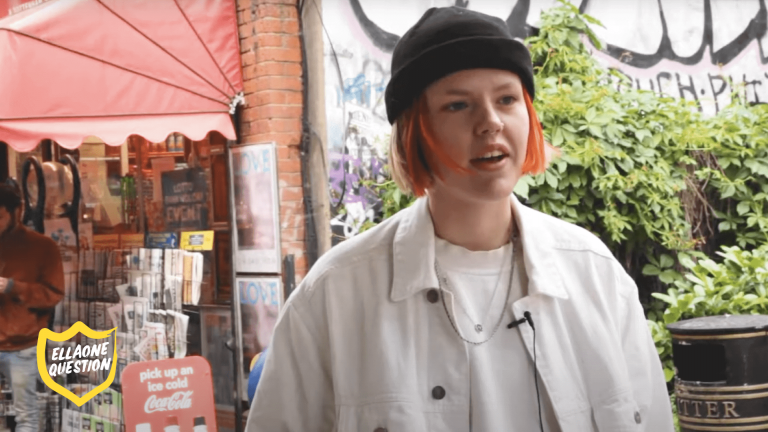
Should sexual pleasure, particularly female sexual pleasure, be spoken about at school?
Almost half of British women cannot correctly locate the vagina on a medical diagram, according to a survey conducted in 2016 by The Eve Appeal, while 70% of those same women could correctly label a penis.
This is partly down to sex education and how the vulva, the clitoris and sexual pleasure are often absent from the classroom.
So should schools teach teenagers about the clitoris and, by default, female sexual pleasure?
“Our workshops are mostly student led,” says Becky, “we might make playdough genitals, for example, and then we talk about the anatomy and included in that we talk about the clitoris.”
“The workshop leader will talk about the clitoris and how sensitive it is. We won’t dwell on the clitoris if there are no questions, but if someone asks something like ‘why do people have sex if they don’t want to have babies’ then we may say something like ‘a lot of people find that sex feels good and it’s a healthy part of their well being’.
“Talking about sexual pleasure is paramount,” she continues, “ because it ties in with consent and what you might want from a sexual experience and understanding why you want some things and why you don’t want certain other things.”
Can poor sex education at school lead to a lack of sexual understanding in adults?
If you don’t learn about sex in school, and your parents don’t feel comfortable talking about it, then where do you get your information? If you’re turning to your friends, or to porn, for your sex education, you’re unlikely to get the full picture.
“When you hit puberty and you have loads of questions, and if you don’t have anyone to ask about those things, you might end up believing myths which are spread by older siblings or people in our year group,” says Becky
“The gaps can be in anything from general anatomy, the function of your genitals and which parts do what, to why certain things feel good and why other things don’t feel good,” she continues.
What was Becky’s sex education like?
“I don’t remember it being appalling, in fact I barely remember it at all,” says Becky, “the one funny thing was when I was 14 we had an afternoon session on sex education taught by the sixth formers.”
“They were very embarrassed, we were very embarrassed, there were only about two years of age between us and I think that one of my mates was going out with one of them,” she continues. “it was very bizarre, I think it was part of their PSHE training or something, so that was quite embarrassing.
“Really I don’t remember learning much. I’m lucky that I had pretty open parents, not that they explicitly sat me down to talk about it, but it was never kind of completely off the table or something that wasn’t to be spoken about. I was very lucky to have parents who were open to those things.”
Should sex education in schools cover emergency contraception?
In a recent Family Planning Association (FPA) survey of over 2,000 women, only 37% of 16-24 year olds had learned about emergency contraception as part of their sex education.
This has led 50% of those surveyed by the FPA to believe the morning after pill causes a mini abortion, which it does not.⁴
Why are there so many misconceptions about emergency contraception? “I feel like there’s a lot of extra shame with emergency contraception,” says Becky, “there’s this idea that the morning after pill is for someone who is completely reckless, which is so unfair.”
“There’s a lot of embarrassment about going to get the morning after pill,” she continues, “a lot of ‘ooooh shit, have to get the morning after pill, naughty me’.”
“You shouldn’t be using it as your primary form of contraception, but these things happen and the morning after pill is there for a reason.”
Do you have any memories of sex education? Worried about any gaps in your sexual knowledge? Get in touch on social using hashtag #AskElla.
With so many myths and misconceptions about the morning after pill floating around, it’s really important that people have access to honest stories from real people who have taken it.
If you have a story to share, head over to our submissions page and help us end the stigma.
Words: Sophia Moss
ellaOne® 30mg film-coated tablet contains ulipristal acetate and is indicated for emergency contraception within 120 hours (5 days) of unprotected sex or contraceptive failure. Always read the label.
